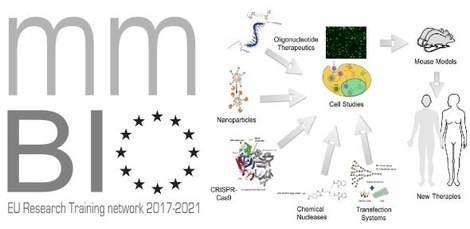Marie Skłodowska-Curie Action ITN MMBio
“MMBio -Molecular Tools for Nucleic Acid Manipulation for Biological Intervention”
MMBio is a Marie Curie Initial Training Network set up to provide young researchers with hands-on research experience and formal training in the classically separate disciplines of Chemistry and Biology in twelve European partner groups: eight academic groups, one medical school and three companies.
Network Coordinator: Prof Florian Hollfelder- Dept of Biochemistry, University of Cambridge, UK
Research area:
High-throughput assay systems
Droplet microfluidics
Enzyme models
Mechanistic enzymology
Chemical biology
Directed evolution
Protein engineering
The project

Training is highly interdisciplinary in nature: workshops and regular network meetings will provide a venue to command a much broader chemical biology skill set than usual, encompassing organic synthesis, quantitative mechanistic analysis, directed enzyme evolution, cell biology, genetics, microfluidic engineering and experimental medicine. The training programme builds on two previous Marie-Curie initiatives, ENDEVAN, coordinated by Prof. A. J. Kirby FRS and PhosChemRec.
Research and training in this area strongly interface basic research with industrial applications. Ultimately our understanding of the basic science of nucleic acid manipulation should lead to useful applications on the long term, e.g. to artificial nucleases, with potential roles in gene regulation, if efficient catalysis can be combined with selective recognition. Crucially for therapeutic success these reagents have to be delivered into the cell, which is why delivery issues are also addressed. The incorporation of industrial partners (AstraZeneca, MedImmune, SP Process Development) ensures that the full life-span of drug development is covered in this training programme – and may provide a conduit for utilising and marketing the results of this collaborative programme. The training programme encompasses courses on IP protection, the research-to-market process and case studies of successful spin-outs - as well as science communication.
Objectives
The objective of MMBio is to develop enabling technologies to ultimately cure cellular disease phenotypes by employing molecular, chemical and biological approaches to interfere with gene expression precisely and selectively. MMBio will focus on unconventional new therapeutic approaches, namely “genetic” drugs that are typically based on oligonucleotides (ONs). Reaching these objectives will include multiple skills of Chemical Biology: synthetic chemistry, quantitative mechanistic analysis of recognition and catalysis, high-throughput screening in microfluidic systems, work with nanoparticles and directed evolution of enzymes.
Role of Ghent University
At Ghent University we will focus on the design and synthesis of new chemical oligonucleotide probes to study nucleic acid interstrand crosslinking and applying these tools for target identification purposes in extracellular and intracellular contexts. The major part of the research studies will focus on the chemistry of development of new oligonucleotide constructs for microRNA, mRNA and DNA targeting. The research also concerns conjugation of the oligonucleotides to peptides.
WEBSITE: mmbio
Contact
Prof. Annemieke Madder
Department Organic and Macromolecular Chemistry
Phone number: +329264 44 72
E-mail: Annemieke.madder@ugent.be
